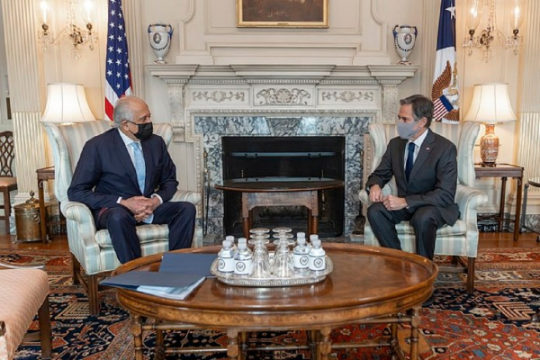Afghanistan Endgame: Bumpy Road Ahead
Sheikh Shabir Kulgami | 22 February 2021
The peace deal signed between the Taliban and the United States in Qatari capital Doha on Feb. 29 last year, was expected to usher in a new dawn of peace and stability in Afghanistan following a two-decade fierce war in the country. However, there have been no positive breakthroughs since except the deal prescribed negotiations between the insurgents and the Afghan government and the US troops pullout. Contrarily, Afghanistan has seen an alarming escalation in bloodshed and both the parties to the deal have continued to see each other with suspicion and mistrust. Pertinently, the deal seems to be on road to collapse.
The Taliban group has asked the US to honor the Doha deal promising the withdrawal of all foreign forces from Afghanistan by May 2021: “we urge the American side to remain committed to the full implementation of this accord,” the group’s co-founder Mullah Abdul Ghani Baradar in an open letter to the American public wrote. The statement clearly reflects the insurgents’ concern regarding the failure of the deal and its subsequent consequences for them and for the future of Afghanistan.
What triggers the concern is the Joe Biden administration‘s recent announcement of reviewing the Doha deal and whether or not to adhere to the upcoming May 01 deadline to withdraw from Afghanistan. The NATO meeting on Feb. 17 & 18 has almost echoed the Biden administration’s decision. “We can already say that we are not yet in a position to talk about the withdrawal of international forces from Afghanistan,” German Defense Minister Annegret Kramp-Karrenbauer said as she arrived for the meeting.
Though President Biden in his first foreign policy speech made no mention to Afghanistan, the senior officials in his administration are not yet in a position to say whether to call back the remaining 2,500 troops before the deadline. Changing the deadline can prove a risky affair in view of the Taliban’s warning of dangerous escalation if the deal is not abided by. Besides, the breach will be seen as America’s betrayal by the insurgent group and cast Washington as an incredible partner when it comes to complying with the terms of an accord.
Subsequently, the insurgents may seek to resume their fight against the foreign forces, a situation which is possible to bring back the horrible scenes of bloodshed in Afghanistan. That not only is likely to deal a big blow to the peace efforts but also is likely to shutter hopes of future negotiations involving the Taliban. Not sticking to the May deadline can also push the lengthy diplomacy by Iran, China, the US, Afghanistan and Pakistan – all stakeholders to end the Afghan war – into the dustbin of history.
As Washington is seeking a dignified end to its longest war in Afghanistan, it is a possibility that the current US administration would like to formulate a strategy which enables it to save face and make the approaching deadline dependent on some factors. That said, the Taliban fighters may seek an escalation in their efforts to send foreign forces packing; the talks between them and Afghan government – going on in Doha — could collapse and Afghanistan could go back to square one.
For the Taliban, honoring of the Doha peace deal will be a landmark development and symbolic of their victory over the US: the deal has recognised them as stakeholders to the Afghan peace process and handed them an opportunity to return to Kabul with new zeal and expectations of regaining power they lost post the US entry into Afghanistan. But America is reviewing the Doha deal, accusing the insurgent group of not keeping its promises such as reducing attacks, cutting ties with Al Qaeda and carrying out targeted assassinations of judges, journalists and politicians. The US congress mandated a study, calling for a delay in the troop exit and warning that the pullout would hand the Taliban a victory.
Meanwhile the ongoing talks, mandated by the Doha agreement, between the Taliban and Kabul are yet far from reaching any convincing conclusion. The talks stop and go, signalling either unwillingness or inability by the two parties for taking the talks to a logical conclusion. Moreover, the delay in concluding the negotiations indicates that certain thorny issues are blocking their smooth conduct. The all-important issue is to decide on the future political setup and the constitution for the war-torn country. If the two parties are able to negotiate on the constitution and the power sharing for all the ethnic groups, the future of Afghanistan can be bright and prosperous.
Biden administration’s approach to the Afghan issue is yet to take the final shape and if it entails a stay past the May deadline, then this unilateral decision by America will mark the collapse of the Doha deal. It is noteworthy that Feb. 29 Doha accord is anything but perfect: both the Taliban and the US, the two parties to the accord, are seeking to ensure its adherence at the cost of each other. Possibly, that is the biggest hurdle in the deal’s smooth and serious compliance.
Sheikh Shabir Kulgami is a Kashmiri (India) political commentator, analyst and columnist.
This article was originally published on The Geopolitics.
Views in this article are author’s own and do not necessarily reflect CGS policy.
